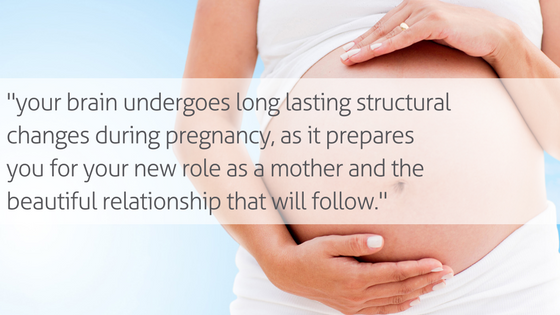
Brain Changes During Pregnancy May Prepare You for Motherhood
By Chris Hohol, Director of Operations, Senescence Life Sciences
Women deal with a lot of physical and physiological changes during pregnancy, from stretch marks to hormonal surges, but relatively little is known about changes to their brain.
Are any changes taking place? What are they? Are they permanent? A recent study published in the journal Natural Neuroscience in December, 2016 set out to start to answer these questions.
The study compared high resolution brain scans of 25 women and 19 of their partners before and after their first pregnancy, along with the scans of 20 women who were not pregnant during the same period.
In summary – the results showed that your brain undergoes long lasting structural changes during pregnancy, as it prepares you for your new role as a mother and the beautiful relationship that will follow.
The pregnant women experienced notable reductions in gray matter in regions relating to the cerebral cortex. Specifically, ones associated with social cognition. Empathy, interpreting and reacting to social signals and the ability to understand and think about what someone else might understand and think about (attributed to “the theory of mind”) being some of the key social processes these regions are responsible for.
Though a “notable reduction in gray matter” may sound undesirable at first, there are many different positive reasons why this reduction takes place. Further, no significant negative impact on cognition was observed in the pregnant women when tests were administered before and after their pregnancy.
While the study itself did not pinpoint the exact cause or reason behind the reduction, the prevailing explanation was that the pregnant mothers brains were undergoing “synaptic pruning” – a fine tuning of neuronal pathways in the brain that is part of healthy brain aging and also observed during the teenage development years. This fine tuning is thought to make these pathways more efficient and specialized in communicating with one another.
So what does all of this mean?
In all likelihood it means that expectant mothers are actually experiencing changes in their brains that are beneficial to raising a child. That these changes are occurring in regions of the brain associated with interpreting social cues and understanding another’s needs and behaviors point to a process that is designed to prepare a mother for her upcoming role as a caregiver.
The structural changes in the brain were significant enough that the researchers were able to accurately identify all new mothers based only on observing the reduction in gray matter. In fact, they could even accurately correlate the degree of attachment a mother would have for her newborn based on the degree of reduction seen in the gray matter of the mother’s brain.
More work needs to be done to determine the permanence of these changes but this particular study showed they were present for at least 2 years after giving birth. However lasting the changes may be, this initial research gives us a better idea of how a mother’s brain may naturally adapt in order to nurture a new bond between her and her child.

Along with the many sleepless nights and turbulent days I put my mother through that undoubtedly affected her brain in some capacity, I’ve developed a new appreciation for just how much of an impact on her brain I actually had, as apparently I was already at it well before I was born.
To be fair though, it would seem I was only helping to prepare Mom for what lay ahead in raising me…
Happy Mother’s Day!
Source:
Hoekzema, E., et al. Pregnancy leads to long-lasting changes in human brain structure. Nat Neurosci. 2017 Feb;20(2):287-296. doi: 10.1038/nn.4458. Epub 2016 Dec 19.
Subscribe to our RSS Feed.